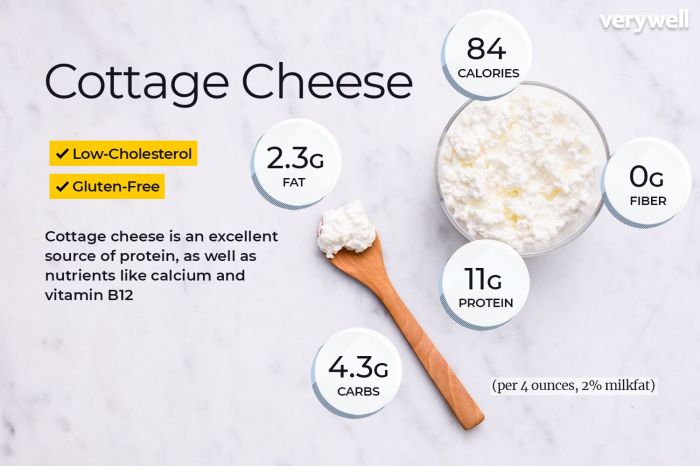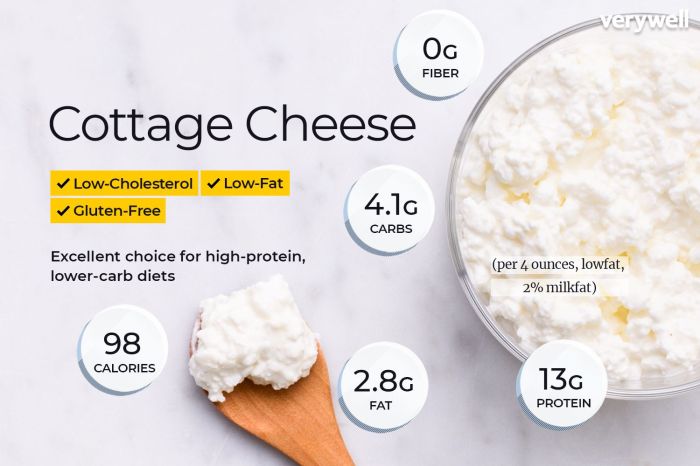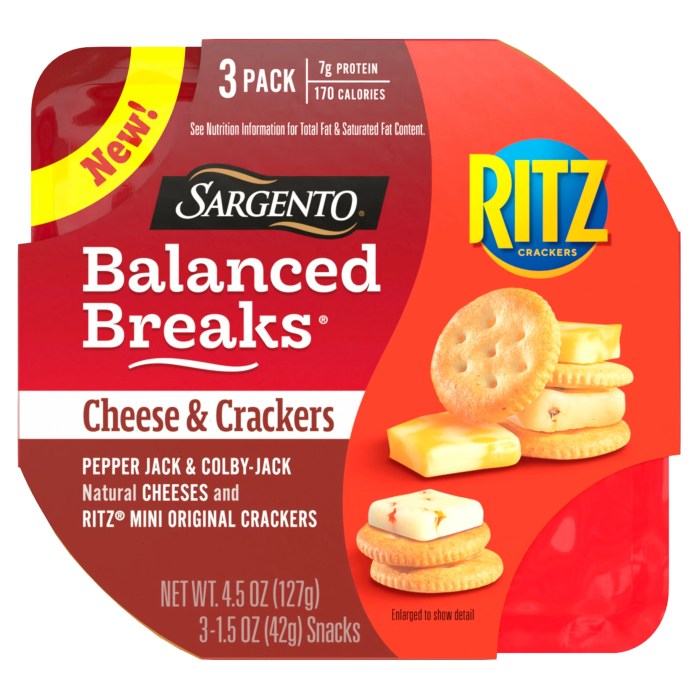Health Benefits Associated with Cottage Cheese Consumption

1 cup of cottage cheese nutrition facts – Cottage cheese, a dairy product made from curdled milk, offers a diverse array of nutritional benefits contributing to overall health and well-being. Its unique composition, rich in protein, calcium, and various micronutrients, makes it a valuable addition to a balanced diet. This section will explore the significant health advantages associated with regular cottage cheese consumption, supported by scientific evidence.Cottage cheese’s high protein content significantly contributes to satiety, muscle growth, and repair.
One cup of cottage cheese offers a good source of protein and calcium, but the fat content can vary. If you’re comparing it to other cheeses, checking the nutritional information is key; for instance, you can easily find details on a cheddar cheese nutrition facts label to see how the numbers stack up. Ultimately, understanding the nutrition facts for both helps you make informed choices about your dairy intake.
The protein in cottage cheese is a complete protein, meaning it contains all nine essential amino acids that the body cannot produce on its own. This is crucial for building and repairing muscle tissue.
Cottage Cheese and Satiety
The high protein content in cottage cheese plays a crucial role in promoting satiety, or the feeling of fullness. Protein takes longer to digest than carbohydrates, leading to a sustained feeling of fullness and potentially reducing overall calorie intake. A study published in theAmerican Journal of Clinical Nutrition* found that diets higher in protein led to increased satiety and reduced energy intake compared to diets lower in protein (Leidy et al., 2015).
This effect is particularly beneficial for weight management and preventing overeating.
Cottage Cheese and Muscle Growth and Repair
Cottage cheese is an excellent source of high-quality protein, essential for muscle growth and repair. The protein in cottage cheese is comprised of casein and whey proteins. Casein is a slow-digesting protein, providing a sustained release of amino acids into the bloodstream, ideal for overnight muscle recovery. Whey, on the other hand, is a fast-digesting protein, offering a rapid supply of amino acids for immediate muscle protein synthesis.
This combination makes cottage cheese a valuable food for athletes and individuals seeking to build or maintain muscle mass. Research consistently demonstrates the positive impact of adequate protein intake, particularly from sources like cottage cheese, on muscle hypertrophy (increased muscle size) and strength gains (Phillips, 2016).
Cottage Cheese and Bone Health
Cottage cheese is a rich source of calcium, a crucial mineral for maintaining strong and healthy bones. Calcium is the primary structural component of bones, and adequate intake is essential for preventing osteoporosis and other bone-related diseases. Furthermore, cottage cheese contains phosphorus, another essential mineral for bone health that works synergistically with calcium. The combination of calcium and phosphorus in cottage cheese contributes to optimal bone density and reduces the risk of fractures (NIH Office of Dietary Supplements, n.d.).
Cottage Cheese and Blood Sugar Regulation
Cottage cheese’s relatively low glycemic index (GI) contributes to blood sugar regulation. The low GI indicates that cottage cheese causes a slower and more gradual rise in blood glucose levels compared to high-GI foods. This is beneficial for individuals with diabetes or those at risk of developing the condition. The protein and fat content in cottage cheese also help to slow down the absorption of carbohydrates, further contributing to blood sugar control (Brand-Miller et al., 2003).
Micronutrient Contributions to Overall Health
The various micronutrients present in cottage cheese contribute significantly to overall health and well-being.
- Calcium: Essential for bone health, muscle function, and nerve transmission.
- Phosphorus: Crucial for bone health, energy production, and cell signaling.
- Riboflavin (Vitamin B2): Important for energy metabolism and maintaining healthy skin and eyes.
- Vitamin B12: Essential for nerve function, red blood cell formation, and DNA synthesis.
- Selenium: An antioxidant that protects cells from damage and supports thyroid function.
Incorporating Cottage Cheese into a Balanced Diet

Cottage cheese, a versatile and nutrient-rich dairy product, offers significant opportunities for enhancing various dietary approaches. Its high protein content, coupled with its relatively low fat and carbohydrate profile, makes it a valuable addition to meals and snacks aimed at weight management, muscle building, or simply maintaining a balanced and healthy diet. Strategic incorporation of cottage cheese can significantly improve the nutritional quality and satiety of a wide range of dishes.Cottage cheese’s adaptability allows for seamless integration into diverse dietary plans.
Its mild flavor profile complements both sweet and savory dishes, providing a creamy texture that enhances the overall culinary experience. This adaptability makes it an ideal food for individuals seeking to increase their protein intake while maintaining dietary variety and enjoyment.
Creative Incorporation of Cottage Cheese into Meals and Snacks
The versatility of cottage cheese allows for creative incorporation into various meals and snacks. For breakfast, it can be combined with fruits, nuts, and seeds for a protein-packed parfait. At lunch, it serves as a base for savory salads, providing a creamy texture and substantial protein content. Dinner options include incorporating cottage cheese into frittatas or using it as a topping for baked potatoes, adding both flavor and nutritional value.
For dessert, cottage cheese can be blended into smoothies or used as a base for creamy, low-fat cheesecakes.
Benefits of Cottage Cheese in Different Dietary Approaches, 1 cup of cottage cheese nutrition facts
Adding cottage cheese to a weight-loss diet can be highly beneficial. Its high protein content promotes satiety, helping to curb appetite and reduce overall calorie intake. The protein also supports muscle mass retention during weight loss, contributing to a healthier body composition. For individuals focused on muscle gain, cottage cheese provides a readily available source of protein crucial for muscle repair and growth, particularly when consumed post-workout.
High-protein diets often benefit from the inclusion of cottage cheese due to its protein density and relatively low fat content. This allows individuals to meet their protein requirements while maintaining a balanced macronutrient profile.
Cottage Cheese Recipes
The following table presents five diverse recipes showcasing the versatility of cottage cheese:
| Recipe Name | Ingredients | Description |
|---|---|---|
| Cottage Cheese and Berry Parfait | 1/2 cup cottage cheese, 1/2 cup mixed berries, 1/4 cup granola | Layer cottage cheese, berries, and granola in a glass for a quick and healthy breakfast. |
| Savory Cottage Cheese Salad | 1 cup cottage cheese, 1 cup chopped vegetables (cucumber, tomatoes, bell peppers), 2 tablespoons olive oil, lemon juice, herbs | Combine cottage cheese with chopped vegetables, a light vinaigrette, and fresh herbs for a protein-rich lunch. |
| Cottage Cheese and Spinach Frittata | 3 eggs, 1/2 cup cottage cheese, 1 cup spinach, 1/4 cup chopped onion, salt and pepper | Whisk eggs with cottage cheese, then add spinach and onion. Bake in oven for a protein-rich and flavorful dinner. |
| Baked Potato with Cottage Cheese and Chives | 1 baked potato, 1/4 cup cottage cheese, 1 tablespoon chopped chives | Top a baked potato with cottage cheese and chives for a simple and satisfying meal. |
| Cottage Cheese Smoothie | 1/2 cup cottage cheese, 1 cup fruit (banana, berries), 1/2 cup milk or yogurt | Blend cottage cheese with fruit and milk or yogurt for a creamy and protein-rich smoothie. |
FAQ Insights: 1 Cup Of Cottage Cheese Nutrition Facts
Is cottage cheese good for weight loss?
Yeah, man, it’s a decent choice. High in protein, keeps you feeling full, so you’re less likely to snack on rubbish. But portion control is still key.
Can I eat cottage cheese if I’m lactose intolerant?
Depends on your tolerance level. Low-fat or lactose-free versions are usually better tolerated, but everyone’s different. Start small and see how you feel.
How much sodium is in cottage cheese?
Varies depending on the brand and type. Check the label, mate. Low-sodium options are available if you’re watching your salt intake.
Does cottage cheese go off quickly?
Keep it chilled, bruv. It usually lasts a good week or so once opened, but always check the “use by” date.


